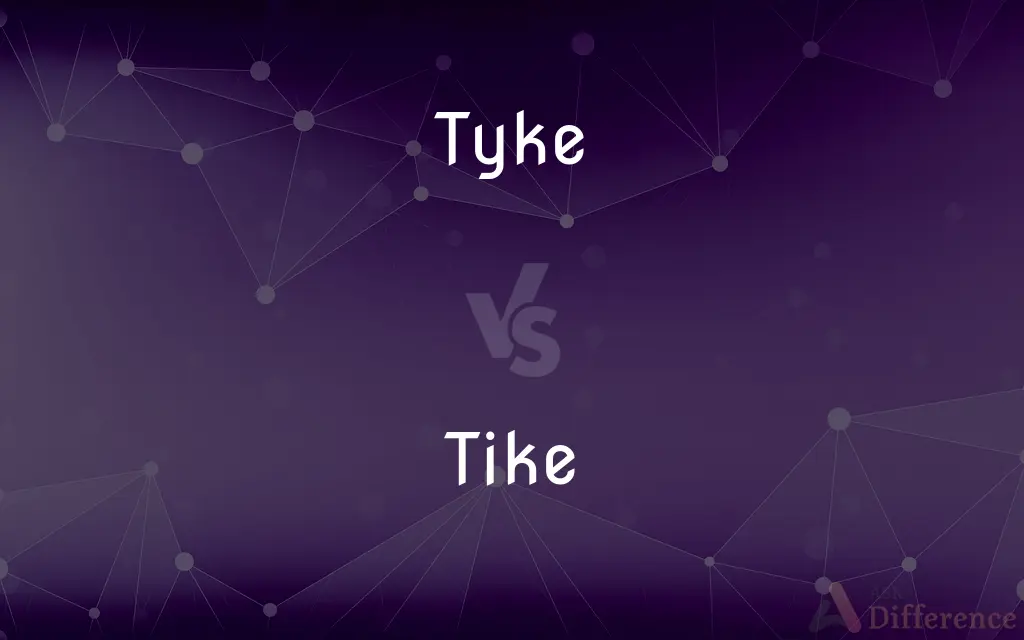Tyke vs. Tike — What's the Difference?
Edited by Tayyaba Rehman — By Urooj Arif — Updated on March 30, 2024
"Tyke" and "tike" are alternative spellings of the same word, referring to a small child, often one that's mischievous or lively. The choice between them is largely a matter of personal or regional preference.

Difference Between Tyke and Tike
Table of Contents
ADVERTISEMENT
Key Differences
"Tyke" is a term used to describe a young child, often implying that the child is boisterous, mischievous, or endearingly rambunctious. It suggests a certain fondness or affection for the spirited nature of children. "Tike," on the other hand, is simply an alternate spelling of "tyke," carrying the same connotations and uses. The choice between "tyke" and "tike" may vary by regional dialects or individual preference, but there is no difference in meaning between the two.
In literature and everyday language, "tyke" is the more commonly seen spelling and is widely recognized in both British and American English. It is often used in a light-hearted or affectionate manner when referring to young children, especially in contexts highlighting their energetic and sometimes challenging behavior. "Tike," while less common, is understood in the same contexts and serves the same purpose of depicting a young, lively child.
The origin of "tyke" (or "tike") is somewhat obscure, but it is thought to derive from a Middle English word for a cur or a low-bred dog, which may explain the term's connotations of mischievousness and unruliness. Over time, the term evolved to refer specifically to children in a more endearing sense, shedding any derogatory implications but retaining a sense of spiritedness and independence.
Both "tyke" and "tike" are informal terms and are most appropriately used in casual conversation or in writing that adopts a conversational or informal tone. They are not typically used in formal writing or official communications but are common in spoken English and in literary contexts that aim to evoke a sense of warmth and affection for the spirited nature of children.
Whether one chooses to use "tyke" or "tike" may depend on regional language influences, personal preference, or the spelling conventions of the audience. Both spellings are correct and interchangeable, with no significant difference in connotation, usage, or perception between them.
ADVERTISEMENT
Comparison Chart
Definition
A young, often mischievous or lively child.
An alternate spelling of "tyke," with identical meaning.
Connotation
Endearing, affectionate towards a child's spirited nature.
Same as "tyke," implying spiritedness and liveliness in a child.
Common Usage
More commonly used in both British and American English.
Less common, but recognized and understood in the same contexts.
Origin
Derived from a Middle English term for a low-bred dog, now used affectionately for children.
Same origin as "tyke," reflecting the term's evolution in language.
Formality
Informal, used in casual or conversational contexts.
Same level of informality, suitable for similar contexts as "tyke."
Compare with Definitions
Tyke
An affectionate term for a small child, especially one that is lively or mischievous.
The little tyke ran through the house, laughter echoing behind him.
Tike
Carries the same affectionate and light-hearted tone as "tyke."
Watching the tike discover snow for the first time was a joy.
Tyke
Reflects an endearing attitude towards children's energetic behavior.
The park was filled with tykes playing soccer and tag.
Tike
An alternate spelling of "tyke," meaning a young, energetic child.
The tike woke up at dawn, ready for adventure.
Tyke
Used to convey fondness or amusement at a child's actions.
That tyke of yours is full of energy and surprises.
Tike
Indicates a lively and sometimes mischievous young child.
The little tike couldn't resist jumping into every puddle.
Tyke
A small child, especially a boy.
Tike
Variant of tyke.
Tyke
A mongrel or cur.
Tike
Alternative spelling of tyke(mongrel dog)
Tyke
Chiefly British A man considered uncouth or mean; a boor.
Tike
Alternative spelling of tyke(Yorkshireman)
Tyke
(dialectal) A mongrel dog.
Tike
A boorish person.
Tyke
(colloquial) A small child, especially a cheeky or mischievous one
Tike
Archaic form of tick(a kind of arthropod)
Tyke
(Canadian) An initiation level of sports competition for young children en
Tike
A tick. See 2d Tick.
Tyke
An uncultured, crude and unrefined or uncouth ill-bred person
Tike
A dog; a cur.
Tyke
A person from Yorkshire; a Yorkshireman or Yorkshirewoman
Tike
A countryman or clown; a boorish, clumsy, or eccentric person; - also spelled tyke.
Tyke
A Roman Catholic
Tike
A small child; - variant of tyke.
Tyke
See 2d Tike.
Tike
A crude uncouth ill-bred person lacking culture or refinement
Tyke
A small child.
Tyke
A crude uncouth ill-bred person lacking culture or refinement
Common Curiosities
What is the origin of "tyke"/"tike"?
The term originates from Middle English, initially referring to a low-bred dog, but has since evolved to affectionately refer to young children.
Can "tyke" or "tike" be used in formal writing?
Both terms are considered informal and are best suited for casual or conversational contexts.
Which spelling is more common, "tyke" or "tike"?
"Tyke" is generally the more common spelling in both British and American English.
Can "tyke"/"tike" refer to anything other than children?
Historically, yes, but in contemporary usage, the terms predominantly refer to young, lively children.
Does the spelling variation affect the meaning of the term?
No, there is no difference in meaning or connotation between "tyke" and "tike."
How do "tyke" and "tike" fit into language evolution?
They exemplify how words can shift in meaning and usage over time, adopting more endearing connotations from possibly derogatory origins.
Are "tyke" and "tike" interchangeable?
Yes, they are interchangeable, with the choice largely depending on personal or regional spelling preferences.
Are there any contexts where "tyke" or "tike" should be avoided?
Given their informal nature, it's best to avoid these terms in formal or official communications.
Is one spelling preferred over the other in certain regions?
There might be regional preferences, but both spellings are understood and accepted in English-speaking regions.
How should I decide which spelling to use?
Consider your audience and personal preference; either spelling is correct and the choice will not alter the meaning or perception of the term.
Share Your Discovery

Previous Comparison
Check vs. Uncheck
Next Comparison
Drainpipe vs. GutterAuthor Spotlight
Written by
Urooj ArifUrooj is a skilled content writer at Ask Difference, known for her exceptional ability to simplify complex topics into engaging and informative content. With a passion for research and a flair for clear, concise writing, she consistently delivers articles that resonate with our diverse audience.
Edited by
Tayyaba RehmanTayyaba Rehman is a distinguished writer, currently serving as a primary contributor to askdifference.com. As a researcher in semantics and etymology, Tayyaba's passion for the complexity of languages and their distinctions has found a perfect home on the platform. Tayyaba delves into the intricacies of language, distinguishing between commonly confused words and phrases, thereby providing clarity for readers worldwide.














































